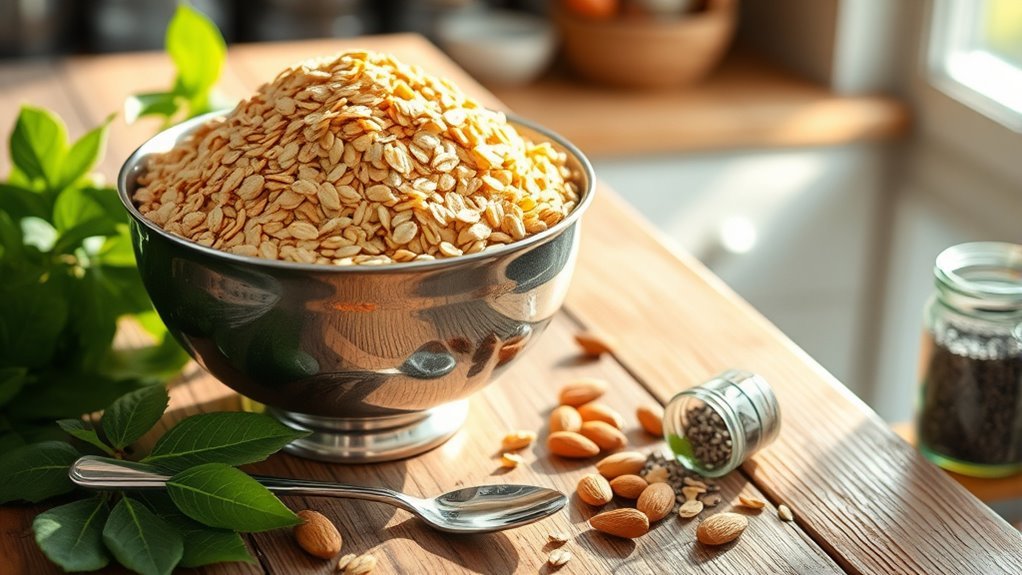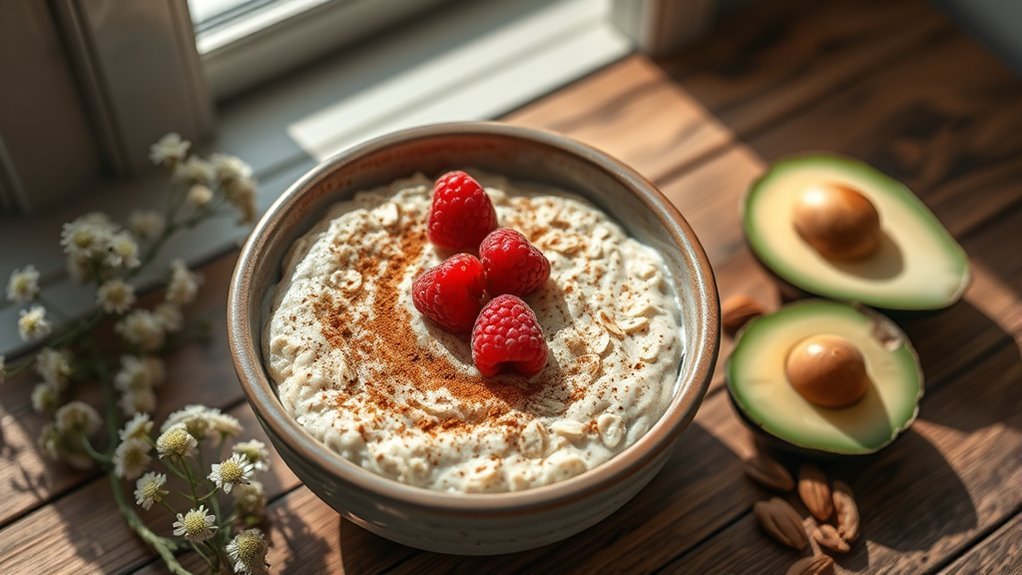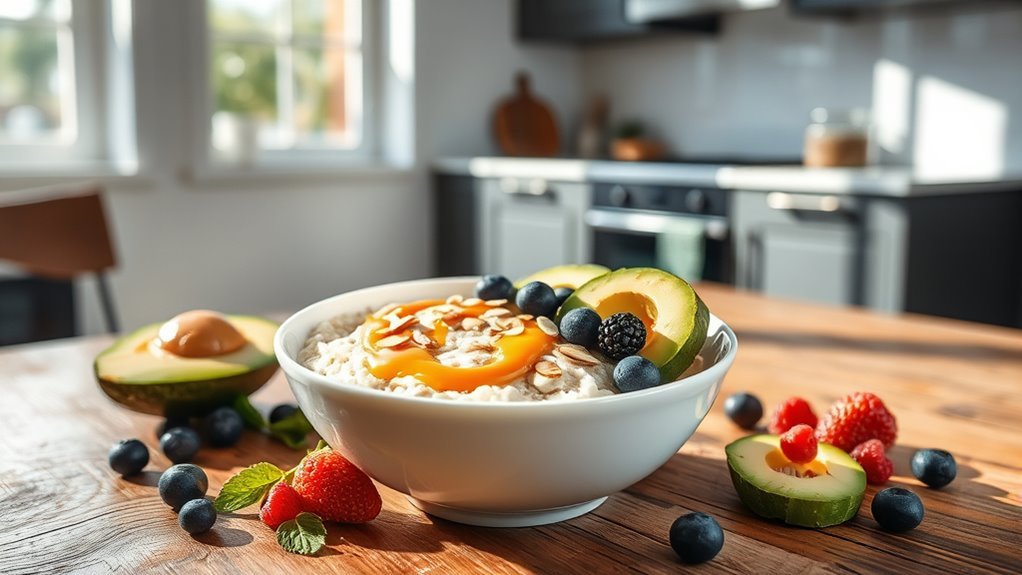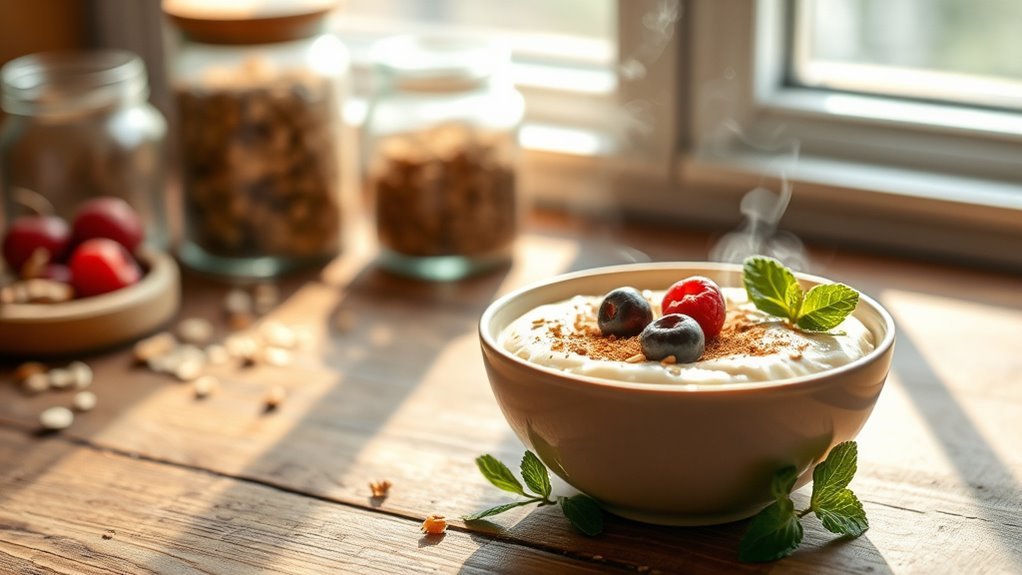While oats offer nutritional benefits, they’re typically too high in carbohydrates for a strict ketogenic diet. One cup of rolled oats can contain around 27 grams of carbs, which can disrupt ketosis. However, if you’re mindful of your overall carb intake, small servings might fit into a more flexible approach. You might want to explore low-carb alternatives and portion control strategies. If you want tips on how to incorporate oats wisely, there’s more to discover.
Understanding the Ketogenic Diet

When you’re looking to understand the ketogenic diet, it’s essential to grasp its core principles. At its heart, the keto diet emphasizes low carbohydrate intake while increasing healthy fats. This shift encourages your body to enter a state called ketosis, where it burns fat for energy instead of carbs. To achieve this, you’ll need to adhere to the keto principles, which typically suggest that around 70-75% of your daily calories come from fats. As you adapt to this new way of eating, you’ll experience fat adaptation, allowing your body to efficiently use fat as its primary fuel source. Embracing these principles can lead to improved energy levels and mental clarity, granting you the freedom to enjoy a different approach to nutrition. Additionally, understanding the importance of macronutrient ratios can help you stay on track with your dietary goals.
Nutritional Profile of Oats

When considering oats in your diet, it’s crucial to understand their carbohydrate content and how it fits into your nutritional goals. Oats are rich in fiber and provide important nutrients, which can be beneficial, but their carb levels may challenge strict keto adherence. Let’s take a closer look at what makes up the nutritional profile of oats.
Carbohydrate Content Overview
Although oats are often praised for their health benefits, their carbohydrate content can be a concern for those following a ketogenic diet. When you look at different oat varieties, the carb counts can vary greatly. For instance, rolled oats contain about 27 grams of carbohydrates per 100 grams, while steel-cut oats might have a similar profile. If you’re practicing carb counting, you’ll need to take these figures into account carefully. Even oatmeal products labeled as health foods can pack in more carbs than you might expect. This makes it essential to assess your daily carb limits and decide if oats fit into your meal plan. Ultimately, understanding the carbohydrate content of oats empowers you to make informed choices while enjoying your keto journey. Additionally, high-carb foods can significantly impact your ability to maintain ketosis.
Fiber and Nutrients
Many people overlook the nutritional benefits of oats, especially when considering their fiber content. Oats are an excellent source of dietary fiber, which supports digestion and helps maintain stable blood sugar levels. They also offer impressive nutrient density, providing essential vitamins and minerals. Here’s a quick look at the nutritional profile of oats:
| Nutrient | Amount per 100g | Benefits |
|---|---|---|
| Dietary Fiber | 10.6g | Aids digestion, promotes satiety |
| Protein | 13.2g | Supports muscle health |
| Iron | 4.7mg | Essential for blood health |
| Magnesium | 177mg | Supports muscle and nerve function |
Including oats in your diet can enhance your fiber sources while still allowing you the freedom to pursue your health goals.
Carbohydrate Content in Oats

When considering oats on a keto diet, it’s essential to look at the carbohydrate content of different oat types. Each variety, from instant to steel-cut, has varying levels of net carbs that can impact your daily intake. Understanding these differences will help you make informed choices that align with your dietary goals.
Oat Types Comparison
Understanding the carbohydrate content in different types of oats can help you make informed choices, especially on a keto diet. In your oat varieties comparison, consider rolled oats, steel-cut oats, and instant oats. Rolled oats, often softer and creamier, contain around 27 grams of carbs per cup. Steel-cut oats, with a chewier texture, have about 29 grams per cup. Instant oats, while convenient, pack around 30 grams due to added sugars. Each variety has distinct oat texture differences that can affect your meal experience. If you’re aiming to stay within your carb limits, it’s essential to choose wisely and consider portion sizes. Knowing these differences empowers you to enjoy oats while adhering to your dietary preferences.
Net Carbs Explained
While oats can be a nutritious choice, it’s important to take into account their net carbohydrate content, especially on a keto diet. Net carbs are calculated by subtracting fiber from the total carbohydrates, as fiber doesn’t greatly impact blood sugar levels. For example, a typical serving of rolled oats contains about 27 grams of total carbs, but with roughly 4 grams of fiber, you’d end up with about 23 grams of net carbs. Understanding ketosis means recognizing that most keto diets aim for around 20-50 grams of net carbs daily. As a result, if you’re looking to stay in ketosis, oats can quickly consume your carb allowance, so it’s vital to approach them with caution and consider portion sizes if you choose to indulge. Additionally, it’s crucial to remember that higher carb legumes like black beans can also hinder ketosis, making carb monitoring essential for your diet plan.
How Oats Affect Ketosis
Although oats are often praised for their health benefits, their impact on ketosis can be quite significant. When you consume oats, you’re introducing carbs that can disrupt your keto metabolism, potentially kicking you out of ketosis. Oats contain oat protein, which is beneficial for muscle repair but comes with a hefty carb count. Even a small serving can contribute to your daily carb limit, making it hard to maintain the low-carb intake required for ketosis. If you’re craving oats, it’s essential to evaluate how they fit into your overall diet. Balancing your carb intake is key, so you might want to explore alternatives that align better with your keto goals while still enjoying the nutrients oats provide. For instance, considering low-carb options like cauliflower rice or zucchini noodles can help you stay on track while satisfying your cravings.
Low-Carb Alternatives to Oats
If you’re looking for low-carb alternatives to oats, chia seed pudding and flaxseed meal cereal are excellent options. Both are rich in fiber and healthy fats, making them satisfying choices that fit well within a ketogenic diet. These alternatives can provide the texture and nutrition you desire without the excess carbs found in traditional oats. Additionally, chia seeds offer high fiber content that aids digestion and promotes gut health, enhancing their appeal as a keto-friendly ingredient.
Chia Seed Pudding
Have you ever wondered how you can enjoy a satisfying breakfast without the carbs that come with traditional oats? Chia seed pudding is a fantastic low-carb alternative, packed with fiber and healthy fats. Simply mix chia seeds with your choice of unsweetened almond milk or coconut milk and let it thicken overnight. You can customize your pudding variations by adding cocoa powder, vanilla extract, or even your favorite keto-friendly sweeteners. For toppings, consider fresh berries, nuts, or unsweetened coconut flakes to enhance flavor and texture. Plus, it’s perfect for meal prep; you can whip up several servings at once. Enjoy the freedom to indulge in a delicious breakfast while staying on track with your keto lifestyle! Including chia seeds also aligns with the keto diet’s emphasis on healthy fats and nutrient-dense foods.
Flaxseed Meal Cereal
Chia seed pudding is a great start, but if you’re looking for another low-carb option, flaxseed meal cereal might be just what you need. Flaxseed offers numerous health benefits, including high fiber content and omega-3 fatty acids, making it an excellent choice for your keto lifestyle. You can easily whip up delicious flaxseed recipes, like a creamy cereal that satisfies your cravings. Additionally, the high fiber content in flax seeds supports digestive health, which is vital for maintaining regular bowel movements on a ketogenic diet.
| Flaxseed Benefits | Flaxseed Recipes |
|---|---|
| High in Omega-3s | Flaxseed Meal Cereal |
| Rich in Fiber | Flaxseed Smoothies |
| Aids Digestion | Flaxseed Pancakes |
Give flaxseed meal cereal a try, and enjoy a nutritious breakfast that keeps you on track with your keto goals!
Incorporating Oats in a Keto Meal Plan
While traditional oats are often avoided on a ketogenic diet due to their higher carbohydrate content, there are ways to incorporate them in moderation for those looking to maintain a balanced approach. You can explore oatmeal alternatives that align better with keto principles, allowing you to enjoy similar textures and flavors. Consider these ideas:
Traditional oats may be high in carbs for keto, but creative alternatives can help you enjoy similar textures and flavors.
- Chia seed pudding for a creamy, fiber-rich base
- Coconut flour porridge for a low-carb option
- Almond flour oatmeal for a nutty twist
- Psyllium husk cereal for added volume and fiber
Top your creations with keto-friendly toppings like unsweetened almond milk, berries, or a sprinkle of cinnamon. By getting creative, you can enjoy satisfying meals while sticking to your keto goals. Additionally, it’s essential to monitor your overall carbohydrate intake throughout the day to ensure you remain within your keto limits.
Portion Control and Serving Sizes
When you’re maneuvering a ketogenic diet, understanding portion control and serving sizes is vital for managing your carbohydrate intake effectively. Oats, while nutritious, can quickly impact your carb count if you’re not careful. To enjoy oats on keto, it’s important to stick to recommended portion sizes. Generally, a serving size of about ¼ cup of dry oats can provide a balanced way to incorporate them. Following serving guidelines helps you stay within your daily carb limits while still enjoying the foods you love. Remember, moderation is key; adjust your portions based on your personal carb goals. By being mindful of serving sizes, you can enjoy a satisfying meal without compromising your ketogenic lifestyle.
Nutritional Benefits of Oats
Oats offer a range of nutritional benefits that can support your overall health, especially when incorporated wisely into your diet. They’re not just tasty; they can also improve your well-being. Here are some key health benefits of oats:
Oats are not only delicious but also packed with health benefits that enhance your overall well-being.
- Rich in Fiber: Oats are high in soluble fiber, which aids in oat digestion and helps maintain a healthy gut.
- Heart Health: They can lower cholesterol levels, reducing the risk of heart disease.
- Blood Sugar Control: Oats can stabilize blood sugar levels, making them a smart choice for energy.
- Nutrient Dense: Packed with vitamins and minerals, oats provide essential nutrients that your body needs.
Potential Risks of Eating Oats on Keto
Although oats are packed with nutrients, their high carbohydrate content poses potential risks for those following a ketogenic diet. If you’re aiming for keto weight loss, consuming oats can quickly push you over your daily carb limit, hindering your progress. This can lead to frustration and derail your efforts. Additionally, oats may spike your blood sugar levels, which is counterproductive on a keto plan focused on maintaining stable energy levels. If you’re craving the texture of oats, consider oat alternatives like chia seeds or flaxseeds, which offer similar benefits without the carbs. Ultimately, while oats have their advantages, it’s essential to weigh these against your keto goals to guarantee you’re making choices that support your lifestyle. Remember to keep your carb intake within the recommended range of 20-50 grams to maintain ketosis effectively.
Creative Keto-Friendly Oat Recipes
While traditional oats aren’t typically keto-friendly, you can still enjoy the comforting flavors and textures reminiscent of oatmeal by using creative alternatives. Here are some delicious oatmeal alternatives that fit perfectly into your keto lifestyle:
Traditional oats may not suit a keto diet, but you can still savor oatmeal-like flavors with innovative alternatives.
- Chia Seed Pudding: Mix chia seeds with almond milk and let it thicken overnight.
- Flaxseed Meal: Combine flaxseed meal with water and microwave for a warm, oatmeal-like consistency.
- Coconut Flour: Cook coconut flour with your choice of nut milk for a creamy base.
- Almond Meal: Blend almond meal with butter and spices for a nutty, satisfying dish.
Top your creations with keto toppings like berries, nuts, or a dollop of unsweetened coconut yogurt to enhance flavor while keeping it low-carb. Enjoy your freedom to indulge! Additionally, these alternatives are a great way to maintain macronutrient ratios that are crucial for success on the keto journey.
Frequently Asked Questions
Can I Eat Oats During a Strict Keto Diet?
You can’t eat oats during a strict keto diet, as they’re high in carbs and conflict with keto guidelines. While oats offer benefits like fiber and nutrients, they can hinder your progress by pushing you over your daily carb limit. If you’re craving something similar, consider low-carb alternatives like chia seeds or flaxseeds, which provide similar textures and health benefits without derailing your keto journey. Balancing freedom with your goals is key!
What Type of Oats Is Best for Keto?
For a keto-friendly option, you’ll want to focus on oat fiber rather than traditional oats. Oat fiber is low in carbs and high in fiber, making it a great substitute. If you’re looking for oatmeal alternatives, consider chia seeds, flaxseed meal, or coconut flour, which can also provide similar textures and nutritional benefits without compromising your carb limits. These options give you the freedom to enjoy a filling breakfast while staying on track with keto.
How Do Oats Compare to Other Keto Grains?
Oats generally have a higher carb content compared to other grains often considered for a keto diet. For instance, while oats offer beneficial oat nutrition, including fiber and protein, they can disrupt ketosis due to their significant carbohydrate levels. Alternatives like almond flour or coconut flour provide lower carb options that can keep you in ketosis while still being versatile for recipes. Balancing your choices is key to maintaining freedom in your eating habits.
Are There Any Keto-Friendly Oat Substitutes?
Think of oat alternatives as a treasure chest filled with low carb grains waiting to be discovered. You can try chia seeds, flaxseeds, or almond flour as excellent substitutes. These options are not only low in carbs but also rich in fiber and healthy fats, keeping you satisfied without derailing your keto journey. Experimenting with these substitutes can give you the freedom to enjoy hearty breakfasts while sticking to your goals.
Can I Have Oat-Based Snacks on Keto?
You’ll want to be cautious with oat-based snacks on keto, as they’re typically high in carbs. Instead, consider exploring keto snack alternatives that satisfy your cravings without derailing your diet. There are delicious oat snack recipes that use keto-friendly ingredients, like nut flours or seeds, to create tasty treats. These options offer you the freedom to enjoy snacks while keeping your carb intake in check, ensuring you stay on track with your goals.
Frequently Asked Questions
1. Can I have oats on a keto diet?
Oats are generally not recommended on a ketogenic diet due to their high carbohydrate content. A typical serving of oats contains around 27 grams of carbs, which can exceed the daily carb limit for those following a strict keto plan. However, some individuals may choose to incorporate small amounts of oats in moderation, particularly if they are on a more flexible low-carb diet. It’s crucial to monitor your total carbohydrate intake to maintain ketosis.
2. What are the carb counts for different types of oats?
The carbohydrate content varies among different types of oats. For example, one cup of cooked oatmeal has approximately 27 grams of carbs, while steel-cut oats contain around 29 grams per cup. Instant oats are even higher, often exceeding 30 grams. If you’re considering oats, it’s essential to check the nutritional information and factor it into your daily carb allowance.
3. Are there keto-friendly alternatives to oats?
Yes, there are several keto-friendly alternatives to oats. Some popular options include chia seeds, flaxseeds, and hemp seeds, which can be used to make pudding-like dishes. Additionally, you can use almond flour or coconut flour to create low-carb porridge. These alternatives are not only lower in carbs but also provide healthy fats and fiber, making them suitable for a ketogenic diet.
4. Can I have overnight oats on a keto diet?
Traditional overnight oats are not keto-friendly because they typically use rolled oats, which are high in carbohydrates. However, you can create a keto version by using ingredients like chia seeds or flaxseeds, combined with unsweetened almond milk or coconut milk, and adding low-carb toppings such as berries or nuts. This way, you can enjoy a similar texture while keeping your carb intake low.
5. What should I consider before including oats in my diet?
Before including oats in your diet, consider your overall carb intake and how strict you are with your keto regimen. If you are aiming for strict ketosis, it may be best to avoid oats altogether. If you decide to include them, start with small portions and monitor how your body responds. It’s also beneficial to consult with a healthcare professional or a nutritionist to ensure that your dietary choices align with your health goals.
References
- https://www.healthline.com/nutrition/keto-diet-foods
- https://www.ncbi.nlm.nih.gov/pmc/articles/PMC6520868/
- https://www.verywellfit.com/what-is-the-keto-diet-5192962
- https://www.webmd.com/diet/what-is-the-keto-diet
- https://www.mayoclinic.org/healthy-lifestyle/nutrition-and-healthy-eating/in-depth/keto-diet/art-20459801


